Kung Pao Chicken
Style: Sichuan Cuisine
Characteristics: The Kung Pao Chicken smells good, with the diced chicken tasting tender, and the peanuts being crispy. Thanks to the various seasonings and the fresh ingredients, the dish presents four features: crispy, aromatic, sweet and spicy.
Kung Pao Chicken, also Gong Bao Ji Ding or Gung Po Chicken, is a traditional dish of Sichuan Cuisine famous both at home and abroad. The mixture of the seasonings makes the dish taste special, and its flavor can be either spicy or mild, which is decided by the amount of chili peppers. Mainly made of diced chicken and peanuts, Kung Pao Chicken also has medical and health preserving value, including nourishing the marrow and replenishing the essence, promoting mental health and preventing the hypertension and heart diseases.
Recipe of Making Kung Pao Chicken:
Ingredients:chicken breast, 150g peanuts, 50-100g |
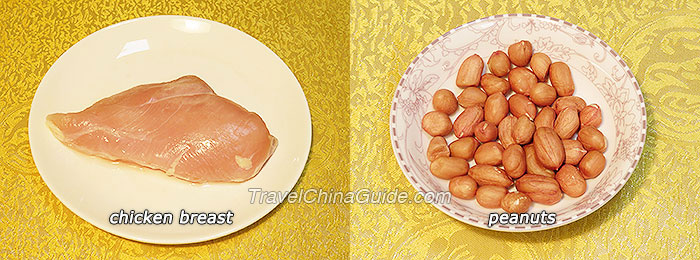 |
Seasongings:cooking oil, green onion, garlic, ginger, 3-5 dry chili peppers, prickly ash seeds, salt, cooking wine soy sauce, white sugar, vinegar, starch Note: The amount of the ingredients and seasonings can be appropriately used according to one’s personal taste. |
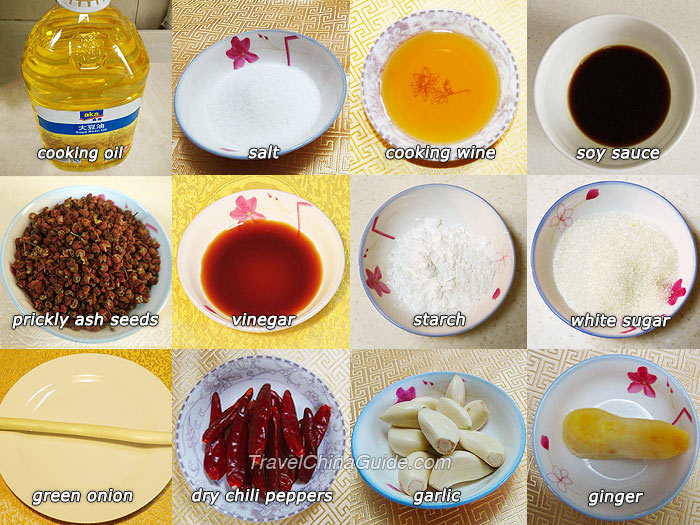 |
Preparation Work:1. Rinse the chicken breast, and dice into 1.5cm cubes; preserve the chicken dices for 10-15 minutes with salt, cooking wine and starch. 2. Trim and clean the green onion and cut into 1-2cm sections; peel the ginger and slice it; get rid of the husk of garlic and slice it; cut the dry chili peppers into 1.5cm sections. 3. Make the seasoning sauce with salt, white sugar, vinegar, cooking wine, soy sauce and a little starch. |
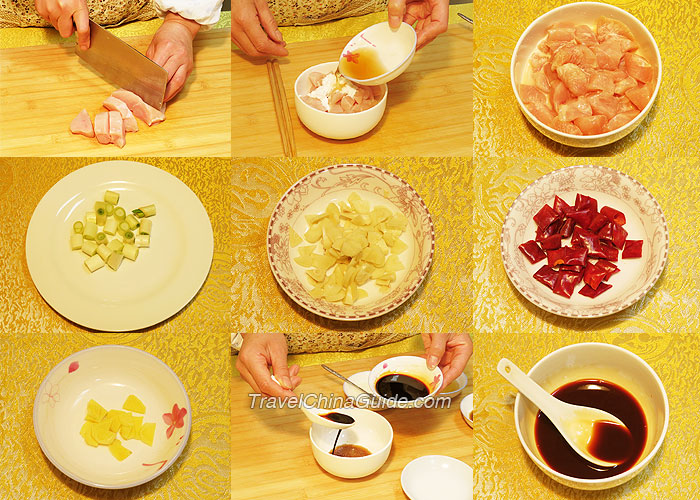 |
Methods:
| STEP 1 Fry peanuts: Pour some cooking oil into a wok, and fry the peanuts above low fire until they taste crispy and appear bright. Take them out for later use. |
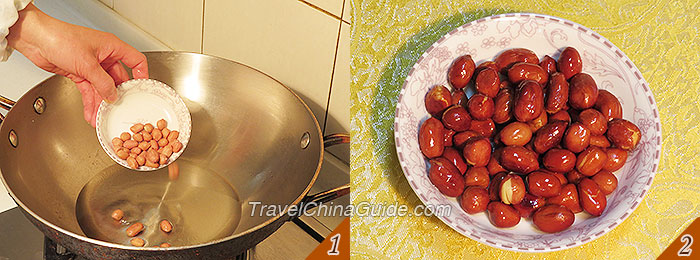 |
| STEP 2 Fry chicken dices: Heat the some cooking oil over medium fire. Add the dry chili peppers, prickly ash seeds, and garlic and ginger slices. When the aroma appears, switch to big fire and pour in the chicken dices. After the chicken dices turn white, add in green onion sections. Stir-fry for 5-10 seconds and fully mix with the chicken. |
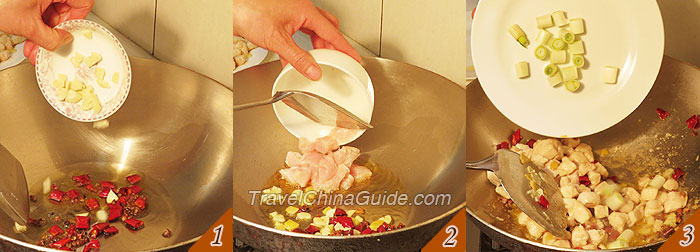 |
| STEP 3 Sauce the chicken dices and add in peanuts: Pour in the prepared seasoning sauce and combine with other ingredients. Fry over big fire until the sauce becomes dense and sticks to the chicken dices. Add the fried peanuts. Stir to mix them all. |
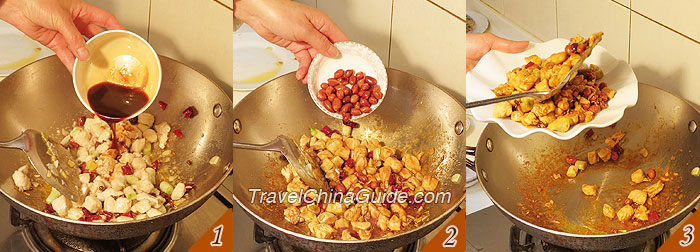 |
| STEP 4 Turn off the heat and dish up. |
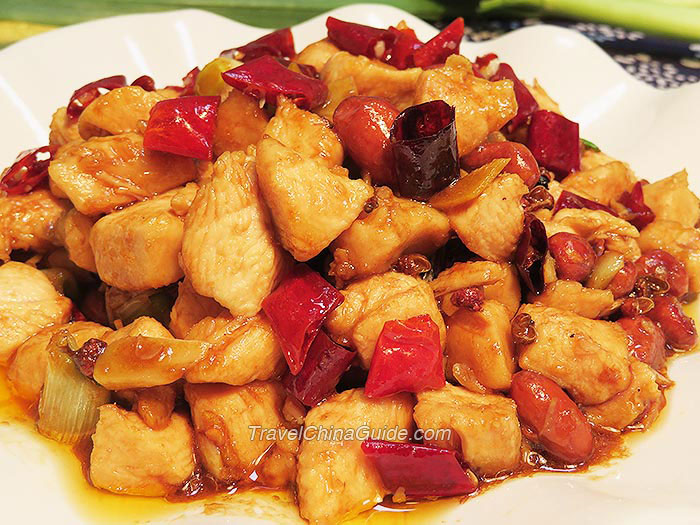 |
Stories about Kung Pao Chicken
Another legend said that this dish originated from Zuo Zongtang, another provincial governor of the Qing Dynasty, who also liked to eat diced chicken matched with peanuts. During that period, the provincial governor was also named 'Gong Bao' or 'Shao Bao', hence the dish he loved was given the name Gong Bao Chicken, pronouncing as Kung Pao Chicken in English.
-
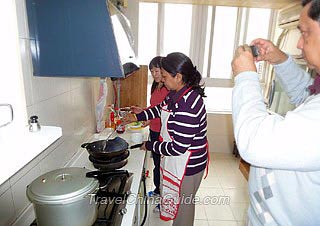
Mr. Debal, Ms. Joyeeta Learn to Cooking Chinese Dish
Mr. Debal, Ms. Joyeeta & Mr. Kirit from India enjoyed a true home-cooked A la carte meal in a local Xi'an family, which is especially provided by TravelChinaGuide. The most impressive was that the food they ate was part of their own labor particularly the Kung Pao Chicken completely cooked by themselves under the help of the hostess. -
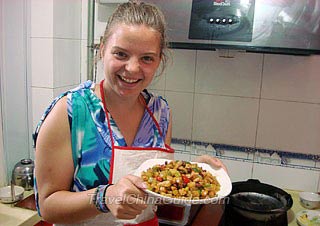
Ms. Skye with the Kung Pao Chicken Cooked by Herself
Mr. Donald & Ms. Skye from USA took part in our family visit in Xi'an and learned to cook the delicious Chinese dish. They were very satisfied with the meal ate in the family and commented it as the best Chinese food that they have ever had.See details at Mr. Donald's feedback -
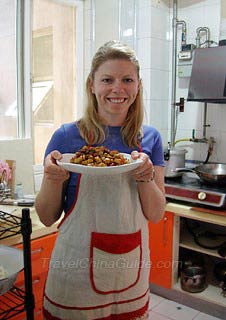
Christina with the Well-Cooked Kung Pao Chicken
Mr. Scott & Mrs. Christina from USA made a family visit under the arrangement by TravelChinaGuide and learned to cook Broccoli with Garlic & Kung Pao Chicken in a local family in Xi'an. They commented it as their favorite in the feedback:"...The meals were great. I was most nervous about the home visit and that turned out to be my favorite..."See details at Mr. Scott's feedback
![]() Further Reading:
Further Reading:
12 Best Chinese Chicken Recipes You Can Try
Top 10 Chinese Dishes You Must Try
More popular meat dishes in China:
Regards,
John
Alan





